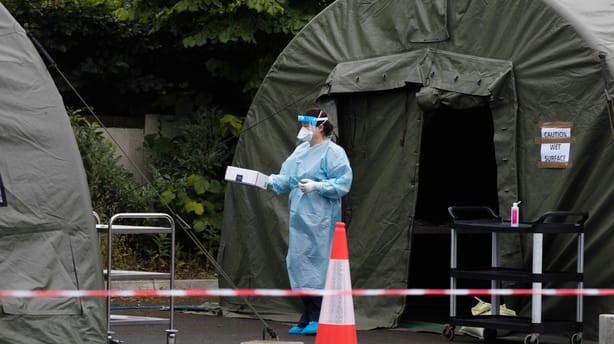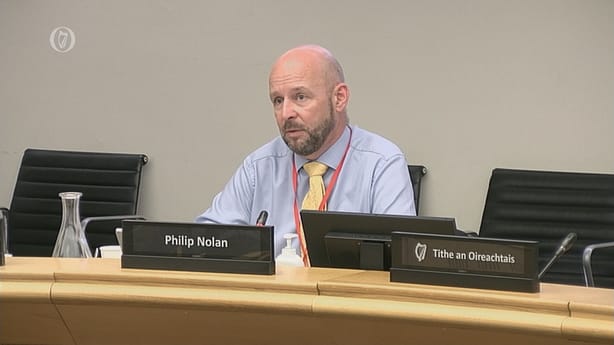Nearly six months on from the first confirmed case here of Covid-19, we have a better understanding of the virus, despite the many uncertainties that remain.
The health service, society, the economy and the political system have also been trying to manage, in this incredibly changed environment.
So with that backdrop, today's Special Committee on the Covid-19 Response had more context and the big players were there - the Minister for Health, Stephen Donnelly, HSE Chief Executive Paul Reid and Dr Ronan Glynn, the acting Chief Medical Officer.
The HSE takes the view that eliminating Covid-19 is not realistic and the plans are no longer around a second surge, but more about managing peaks and troughs.
Paul Reid said the public health measures represent about 80% of what is needed by way of the key defence measures and that testing and tracing represents about 15-20%.
He was challenged as to why the HSE had not reached 100,000 tests a week, as promised and whether it was down to staffing, or funding or other issues?
He explained that testing and tracing is determined by the case definition for the virus, as well as the advice from the National Public Health Emergency Team. At the moment, the HSE is doing about 55,000 tests. But a big volume of serial testing is ahead.

Serial testing is being resumed or being planned for the primary meat factories in the three counties where there was a recent lockdown - that means 50,000 staff. Also around 8,000 people in the Direct Provision area will be tested, along with resumed nursing home tests of 30,000 people.
We learned that where the HSE does this testing in meat factories, the State pays for it. If it is done privately, the factories pay. While this widespread testing helps reassure the public, the cost is high and the return of positive tests is very low at about 0.13%.
With the schools reopening, Dr Henry, the Chief Clinical Officer, emphasised that child-to-child transmission in schools is uncommon.
However he said it is inevitable there will be cases in schools and there may be outbreaks. Public health teams will have to deal with each case based on the circumstances that exist.
He also said that in households, the risk of a child being a primary source of transmission is believed to be low.
Parents will be interested to know that the HSE is also awaiting expert advice on using saliva testing for pre-school and primary school children, as it’s easier and more comfortable than a nasal swab. But there are issues to be clarified first about whether saliva testing is sensitive enough.
In the case of children, the challenge for GPs and parents will be to differentiate between what looks like Covid-19 symptoms and colds, sniffles and upper respiratory infections, which the HSE says will not warrant testing.
Health officials take the view that the current lower number of patients being admitted to hospital is likely due to the younger profile of cases being seen now. Most are under 45 years of age.
We heard today that the virus has not changed and that it is not less transmissible. There is still no treatment or vaccine. Dr Colm Henry also said that there is a 'lag’ between cases seeding in the community and the virus getting into areas where older people are, like residential facilities. That lag is the incubation period of 7-14 days.

Professor Philip Nolan, chairperson of the Irish Epidemiology Modelling Advisory Group, warned that Ireland is at an important juncture when it comes to keeping the virus under control.
He said we will know over the next few weeks if we are able, as a society, to resume social, economic, educational, healthcare, cultural or sporting activities, without spreading the virus.
The flood of information coming at people about coronavirus is difficult to absorb. It can also be quite detailed and nuanced.
For example, Dr Glynn said today that the vast majority of older children in national school and all secondary school pupils should be maintaining a distance of one metre. But he said it was not practical for younger children to social distance.
Dr Glynn, also said that the key to controlling the virus, is to adopt a proportionate response to the evolving epidemiological situation. He wants people to cut down on their discretionary contacts.
Today marked the first appearance before the Committee by Minister Stephen Donnelly.
He said that the focus from now until Christmas is to suppress the virus, while re-opening society.
But if there was a second wave the blunt instrument of a lockdown would have to be considered.
He said that Ireland was entering a second chapter and his Department is preparing a winter plan, with many measures already in place.
That plan will be studied in forensic detail and the performance of the service will be matched against it closely, as the health service heads for a winter like none before.







